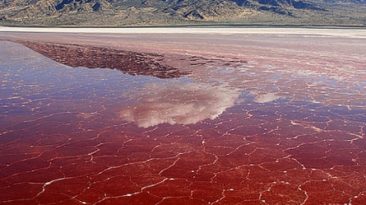Imagine paying just $50 for a solid gold watch. Or only $1,000 for a Ferrari. But wait… these things are tiny. Don’t worry, you won’t even notice. That’s because you’ve been shrunk down. You’re now only 5 inches tall.
What would life be like in this new shrunken world? Would your voice sound like this?
And could this be the key to saving Earth? So, why is that Ferrari so cheap? Well, in a shrunken world everything would cost less. That’s because whatever you desire would require fewer resources.
Let’s say your average gold watch weighs about a third of a pound. Shrink that watch down to less than 10% of its original size, and suddenly the gold required to make this luxury watch is much, much less.
If you had $10,000 in savings right now, that could equate to several million dollars if you decided to shrink down. And those wouldn’t be the only benefits of downsizing.
You’d also be reducing harmful waste and emissions. The garbage from a few hundred shrunken people would be equivalent to the trash of one regular sized person.
And those fancy cars that everyone’s driving? Naturally, these smaller models of vehicle would produce substantially fewer emissions. This would cut down on the planet’s greenhouse gases, cool it down and help with climate change.
You’d only need a drop of gas to fill your tank. A couple milliliters of water could fill your stomach, and a regular sized chicken would feed a whole town.
But not everything would be so easy. There’d be some clear negatives to shrinking down. Apart from the obvious dangers like being squished, or getting eaten by a house cat; you’d have a lot more to worry about.
With your entire body shrinking, your senses would shrink as well, specifically your sense of hearing and sense of sight. Your eyes being tiny little dots on a 5-inch tall body means that the’ll have less light coming in and hitting the retina.
Receiving less light means that everything would appear dark and blurry. You’d be practically blind. Guess that Ferrari will be pretty useless to you. Well, at least you could attend your favorite band’s concert, and you wouldn’t even need to pay for a seat. Wait, sorry, you can’t do that either; since your ears would be so small that they wouldn’t be able to detect sound waves in the frequencies you hear now.
As for your other body parts? Well, it’s probably not a good idea to shrink your respiratory system, as it is pretty complicated. Making it tiny would affect how you breathe.
Your lungs wouldn’t be able to take in the amount of oxygen that you’d need to breathe at such a small scale. You’d have trouble breathing for a couple of minutes and then probably die.
But lets you say you did figure out a way to get oxygen. Well, prepare to be extremely cold. That’s because your mass would be significantly smaller. Less mass means fewer cells, which is what gives your body heat.
To compensate, you’d have to do what other small animals do and maintain a high heart rate. A guinea pig keeps it’s heat up by having a heart rate of up to 350 beats per minute, while humans hearts beat an average of 60.
So get ready to constantly run on a treadmill. Because if you don’t, you might freeze to death. But hey at least you’ll be living in an enormous mansion.
Okay… maybe this wasn’t the best decision. Sure you’ll be rich, and helping the planet; but is it worth it? Probably not. However, if you’re intereested in conservation, there might be something else that humanity can do to achieve similar results.
A study out of NYU looked into bioengineering and how it can affect climate change. The hypothesis was, that if everyone in the United States shrunk by 15 cm (6 inches) men would consume 25% less and women would consume 23% less. This includes things like food, clothing, even gas for the car.
If people were smaller, things would just last longer. A cow could feed more people, since we wouldn’t need as much food. A full tank of gas would go farther, since it won’t be transporting as much weight. And on top of that, we’d all be creating less waste.
Experts say an impact like this would be enough to put a massive dent in climate change, maybe even reverse it.
Researchers are looking into how we can make future generations smaller by genome editing. Although controversial, it might just be the way of the future. Babies might eventually be made in computers instead of in the womb.
Subscribe to What-If on Youtube or follow the show on Facebook Watch.
Sources
- “Would Downsizing Actually Work In Real Life?”. Ling, Thomas, 2018. Radio Times. Accessed December 19 2018.
- “Shrinking Humans Like They Do In ‘Downsizing’ Is Actually Somewhat Possible — And Not Such A Bad Idea”. Brueck, Hilary, 2017. Business Insider. Accessed December 19 2018.
- “Museum Of The Moving Image – Visit – Calendar – Downsizing”. 2018. Movingimage.Us. Accessed December 19 2018.
- “Would We Actually Be Richer If We Shrunk Ourselves À La Downsizing?”. Han, Karen. 2017. Vulture. Accessed December 19 2018.
- “A Foolproof Solution For Saving The Earth: Shrink All Humans”. VanHemert, Kyle. 2013. WIRED. Accessed December 19 2018.
- “Solve Climate Change … Make People Smaller”. Abrahams, Marc. 2014. The Guardian. Accessed December 19 2018.
- “The Small Problem With Shrinking Ourselves”. 2018. Youtube. Accessed December 19 2018.



























